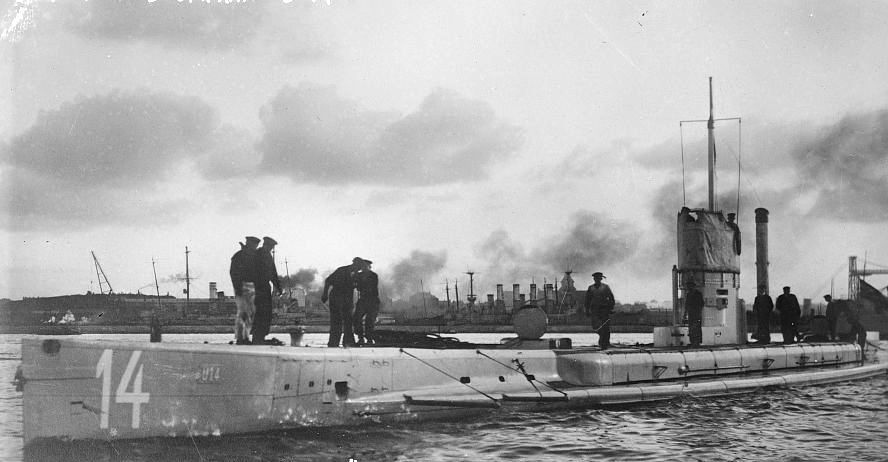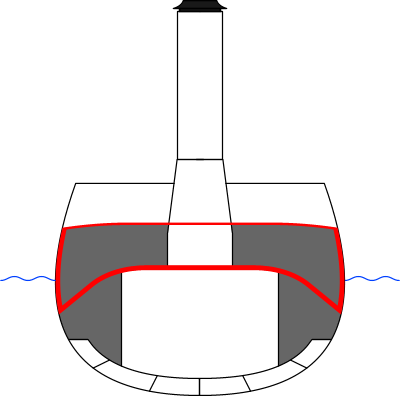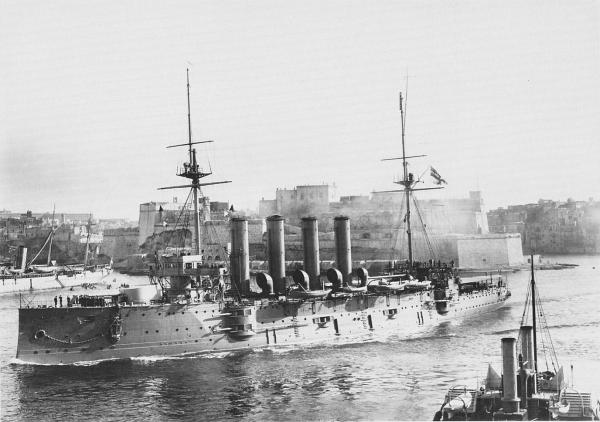|
First Battle Of The Atlantic
The Atlantic U-boat campaign of World War I (sometimes called the "First Battle of the Atlantic", in reference to the World War II campaign of that name) was the prolonged naval conflict between German submarines and the Allied navies in Atlantic waters—the seas around the British Isles, the North Sea and the coast of France. Initially the U-boat campaign was directed against the British Grand Fleet. Later U-boat fleet action was extended to include action against the trade routes of the Allied powers. This campaign was highly destructive, and resulted in the loss of nearly half of Britain's merchant marine fleet during the course of the war. To counter the German submarines, the Allies moved shipping into convoys guarded by destroyers, blockades such as the Dover Barrage and minefields were laid, and aircraft patrols monitored the U-boat bases. The U-boat campaign was not able to cut off supplies before the US entered the war in 1917 and in later 1918, the U-boat bases we ... [...More Info...] [...Related Items...] OR: [Wikipedia] [Google] [Baidu] |
U-boat Campaign
The U-boat Campaign from 1914 to 1918 was the World War I naval campaign fought by German U-boats against the trade routes of the Allies. It took place largely in the seas around the British Isles and in the Mediterranean. The German Empire relied on imports for food and domestic food production (especially fertilizer) and the United Kingdom relied heavily on imports to feed its population, and both required raw materials to supply their war industry; the powers aimed, therefore, to blockade one another. The British had the Royal Navy which was superior in numbers and could operate on most of the world's oceans because of the British Empire, whereas the Imperial German Navy surface fleet was mainly restricted to the German Bight, and used commerce raiders and unrestricted submarine warfare to operate elsewhere. In the course of events in the Atlantic alone, German U-boats sank almost 5,000 ships with nearly 13 million gross register tonnage, losing 178 boats and about ... [...More Info...] [...Related Items...] OR: [Wikipedia] [Google] [Baidu] |
Scapa Flow
Scapa Flow viewed from its eastern end in June 2009 Scapa Flow (; ) is a body of water in the Orkney Islands, Scotland, sheltered by the islands of Mainland, Graemsay, Burray,S. C. George, ''Jutland to Junkyard'', 1973. South Ronaldsay and Hoy. Its sheltered waters have played an important role in travel, trade and conflict throughout the centuries. Vikings anchored their longships in Scapa Flow more than a thousand years ago. It was the United Kingdom's chief naval base during the First and Second World Wars, but the facility was closed in 1956. Scapa Flow has a shallow sandy bottom not deeper than and most of it is about deep; it is one of the great natural harbours and anchorages of the world, with sufficient space to hold a number of navies. The harbour has an area of and contains just under 1 billion cubic metres of water. Since the scuttling of the German fleet after World War I, its wrecks and their marine habitats form an internationally acclaimed di ... [...More Info...] [...Related Items...] OR: [Wikipedia] [Google] [Baidu] |
German U-Boat U-24 Sinks The HMS Formidable New Year's Eve 1914-15
German(s) may refer to: * Germany (of or related to) **Germania (historical use) * Germans, citizens of Germany, people of German ancestry, or native speakers of the German language ** For citizens of Germany, see also German nationality law **Germanic peoples (Roman times) * German language **any of the Germanic languages * German cuisine, traditional foods of Germany People * German (given name) * German (surname) * Germán, a Spanish name Places * German (parish), Isle of Man * German, Albania, or Gërmej * German, Bulgaria * German, Iran * German, North Macedonia * German, New York, U.S. * Agios Germanos, Greece Other uses * German (mythology), a South Slavic mythological being * Germans (band), a Canadian rock band * "German" (song), a 2019 song by No Money Enterprise * ''The German'', a 2008 short film * "The Germans", an episode of ''Fawlty Towers'' * ''The German'', a nickname for Congolese rebel André Kisase Ngandu See also * Germanic (other) * German ... [...More Info...] [...Related Items...] OR: [Wikipedia] [Google] [Baidu] |
HMS E3
HMS ''E3'' was the third E-class submarine to be constructed, built at Barrow by Vickers in 1911-1912. Built with compartmentalisation and endurance not previously achievable, these were the best submarines in the Royal Navy at the start of the First World War. She was sunk in the first ever successful attack on one submarine by another, when she was torpedoed on 18 October 1914 by . Design The early British E-class submarines, from ''E1'' to ''E8'', had a displacement of at the surface and while submerged. They had a length overall of and a beam of , and were powered by two Vickers eight-cylinder two-stroke diesel engines and two electric motors.Akerman, P. (1989). ''Encyclopaedia of British submarines 1901–1955''. p.150. Maritime Books. The class had a maximum surface speed of and a submerged speed of , with a fuel capacity of of diesel affording a range of when travelling at , while submerged they had a range of at . The early 'Group 1' ''E'' class ... [...More Info...] [...Related Items...] OR: [Wikipedia] [Google] [Baidu] |
SM U-27 (Germany)
SM ''U-27'' was a German Type ''U-27'' U-boat built for service in the Imperial German Navy. She was launched on 14 July 1913, and commissioned on 8 May 1914 with Kapitänleutnant Bernd Wegener in command. On 18 October 1914, the British submarine was torpedoed and sunk in the North Sea by ''U-27''. This was the first action in which one submarine sank another. Sinking of HMS ''E3'' had sailed from Harwich on 16 October to patrol off Borkum in the North Sea. On 18 October, ''E3'' spotted some German destroyers ahead but was unable to get into a position to take a shot at them. Unable to pass them, Commander Cholmley retreated into the bay to wait for them to disperse. As he did so, he failed to see that the bay was also occupied by ''U-27'', under ''Kapitänleutnant'' Bernd Wegener. Wegener was surfaced and patrolling between the Ems and Borkum when at 11:25, an object resembling a buoy was spotted where no buoy should be. Suspecting a British submarine, ''U-27'' immedia ... [...More Info...] [...Related Items...] OR: [Wikipedia] [Google] [Baidu] |
Iron Cross
The Iron Cross (german: link=no, Eisernes Kreuz, , abbreviated EK) was a military decoration in the Kingdom of Prussia, and later in the German Empire (1871–1918) and Nazi Germany (1933–1945). King Frederick William III of Prussia established it on 17 March 1813 during the Napoleonic Wars (EK 1813). The award was backdated to the birthday (10 March) of his late wife, Queen Louise. Louise was the first person to receive this decoration (posthumously). Recommissioned Iron Cross was also awarded during the Franco-Prussian War (EK 1870), World War I (EK 1914), and World War II (EK 1939). During the 1930s and World War II, the Nazi regime superimposed a swastika on the traditional medal. The Iron Cross was usually a military decoration only, though there were instances awarded to civilians for performing military functions, including Hanna Reitsch, who received the Iron Cross, 2nd class, and Iron Cross, 1st Class, and Melitta Schenk Gräfin von Stauffenberg, who recei ... [...More Info...] [...Related Items...] OR: [Wikipedia] [Google] [Baidu] |
Action Of 22 September 1914 - EN
Action may refer to: * Action (narrative), a literary mode * Action fiction, a type of genre fiction * Action game, a genre of video game Film * Action film, a genre of film * ''Action'' (1921 film), a film by John Ford * ''Action'' (1980 film), a film by Tinto Brass * '' Action 3D'', a 2013 Telugu language film * ''Action'' (2019 film), a Kollywood film. Music * Action (music), a characteristic of a stringed instrument * Action (piano), the mechanism which drops the hammer on the string when a key is pressed * The Action, a 1960s band Albums * ''Action'' (B'z album) (2007) * ''Action!'' (Desmond Dekker album) (1968) * '' Action Action Action'' or ''Action'', a 1965 album by Jackie McLean * ''Action!'' (Oh My God album) (2002) * ''Action'' (Oscar Peterson album) (1968) * ''Action'' (Punchline album) (2004) * ''Action'' (Question Mark & the Mysterians album) (1967) * ''Action'' (Uppermost album) (2011) * ''Action'' (EP), a 2012 EP by NU'EST * ''Action'', a 19 ... [...More Info...] [...Related Items...] OR: [Wikipedia] [Google] [Baidu] |
British Admiralty
The Admiralty was a department of the Government of the United Kingdom responsible for the command of the Royal Navy until 1964, historically under its titular head, the Lord High Admiral – one of the Great Officers of State. For much of its history, from the early 18th century until its abolition, the role of the Lord High Admiral was almost invariably put "in commission" and exercised by the Lords Commissioner of the Admiralty, who sat on the governing Board of Admiralty, rather than by a single person. The Admiralty was replaced by the Admiralty Board in 1964, as part of the reforms that created the Ministry of Defence and its Navy Department (later Navy Command). Before the Acts of Union 1707, the Office of the Admiralty and Marine Affairs administered the Royal Navy of the Kingdom of England, which merged with the Royal Scots Navy and the absorbed the responsibilities of the Lord High Admiral of the Kingdom of Scotland with the unification of the Kingdom of G ... [...More Info...] [...Related Items...] OR: [Wikipedia] [Google] [Baidu] |
Armoured Cruiser
The armored cruiser was a type of warship of the late 19th and early 20th centuries. It was designed like other types of cruisers to operate as a long-range, independent warship, capable of defeating any ship apart from a battleship and fast enough to outrun any battleship it encountered. For many decades, naval technology had not advanced far enough for designers to produce a cruiser which combined an armored belt with the long range and high speed required to fulfill its mission. For this reason, beginning in the 1880s and 1890s, many navies preferred to build protected cruisers, which only relied on a light armored deck to protect the vital parts of the ship. However, by the late 1880s, the development of modern rapid-fire breech-loading cannon and high-explosive shells made the reintroduction of side armor a necessity. The invention of face-hardened armor in the mid-1890s offered effective protection with less weight than previously. Varying in size, the armored cruiser ... [...More Info...] [...Related Items...] OR: [Wikipedia] [Google] [Baidu] |
Otto Weddigen
Otto Eduard Weddigen (15 September 1882 – 18 March 1915) was an Imperial German Navy U-boat commander during World War I. He was awarded the Pour le Mérite, Germany's highest honour, for sinking four British warships. Biography and career He was born in Herford, in the Prussian Province of Westphalia and started his military career in the ''Kaiserliche Marine'' in 1901. In 1910 he was given command of one of the first German submarines, . In the action of 22 September 1914, while patrolling in the region of the southern North Sea known to the British as the " Broad Fourteens", ''U-9'' intercepted the three warships of the Seventh Cruiser Squadron. Weddigen fired off all six of his torpedoes, reloaded while submerged, and in less than an hour sank the three British armoured cruisers HMS ''Aboukir'', HMS ''Hogue'' and HMS ''Cressy''. Sixty two officers and 1,397 other men were killed, leaving 837 survivors. Weddigen was awarded the Iron Cross, second and first cla ... [...More Info...] [...Related Items...] OR: [Wikipedia] [Google] [Baidu] |
Action Of 22 September 1914
The Action of 22 September 1914 was an attack by the German U-boat that took place during the First World War. Three obsolete Royal Navy cruisers, of the 7th Cruiser Squadron, manned mainly by Royal Naval Reserve part-time reservists and sometimes referred to as the Live Bait Squadron, were sunk by ''U-9'' while patrolling the southern North Sea. Neutral ships and trawlers nearby began to rescue survivors but 1,459 British sailors were killed. There was a public outcry in Britain at the losses. The sinkings eroded confidence in the British government and damaged the reputation of the Royal Navy, when many countries were still unsure about taking sides in the war. Background The cruisers were part of the Southern Force ( Rear-Admiral Arthur Christian) composed of the flagship , the light cruiser and the 7th Cruiser Squadron (7th CS, also known as Cruiser Squadron C, Rear-Admiral H. H. Campbell, nicknamed the ''live-bait squadron''), comprising the armoured cruisers , , , a ... [...More Info...] [...Related Items...] OR: [Wikipedia] [Google] [Baidu] |





